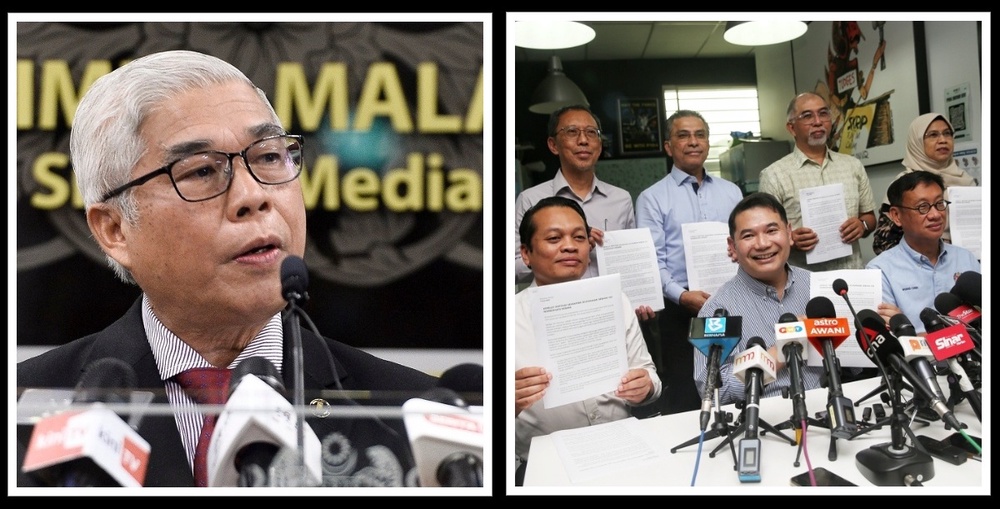
"A Revolt Is Taking Place Within PKR" — Hassan Karim Sounds the Alarm
9 Jul 2025 • 4:30 PM MYT

TheRealNehruism
Writer. Seeker. Teacher

Image credit: Malay Mail/ Malay Mail
By all appearances, something resembling an internal revolt is brewing inside PKR — and veteran MP Hassan Abdul Karim is among the first senior leaders to name it for what it is.
In a stark and unusually candid warning issued today, Hassan cautioned at a group of nine PKR MPs — led by none other than former minister Rafizi Ramli — for calling on the Yang di-Pertuan Agong to form a Royal Commission of Inquiry (RCI) to investigate judicial appointments. His concern wasn’t about the issue itself — but about what this sudden act of open defiance signified within party lines.
If an RCI is formed, Anwar, as the Prime Minister with constitutional authority over judicial appointments, will inevitably come under investigation.
"Anwar becomes the main suspect to be investigated by the RCI. This is the implication of their own demand. Without the Prime Minister’s and Cabinet’s consent, this push will only further damage Anwar’s image and that of his government. These nine PKR MPs have effectively placed Anwar’s neck under the guillotine, like in the French Revolution.”
Although Hassan acknowledged that the judicial issues raised were valid and of public interest, describing them as “the elephant in the room”, he couldn't help also but reflect on the implication of the call to form an RCI over the matter.
“Their actions are progressive, radical, and popular with the public. But are these nine MPs prepared for the possibility that their actions could bring Anwar down?
“Are they ready for the government to fall over this? If they are, then it’s clear that a revolt is taking place within PKR," Hassan said in a statement on Tuesday, a day after Rafizi and his cohorts called for a press conference to press for their demand.
But this may be bigger than just a matter of optics.
The MPs pushing for the RCI — Rafizi included — are, not coincidentally, almost entirely from the faction that lost in the May party elections. That fact alone throws a shadow over their current motivations. Is this really about reform? Or is it about power — and the refusal to accept a democratic loss?
Take Rafizi’s own track record. He was once seen as a party loyalist and policy visionary. But when he lost his position as PKR deputy president in the most recent party polls, he promptly resigned from his cabinet post — even though no one had asked him to. Soon after, he launched a podcast titled "Yang Bakar Menteri", which has so far functioned less as policy critique and more as a flamethrower aimed squarely at the government he once served in.
And now, just over a month after walking away from that government, Rafizi is leading a petition for an RCI that will inevitably embarrass it — or at least create the perception that its hands aren’t clean when it comes to judicial matters. It’s a damning turn for someone who, not long ago, had every opportunity to address these same issues from the inside but chose silence.
The timing, context, and tone of this new campaign raise uncomfortable but necessary questions.
Why now?
Why this?
Why him?
It is difficult to ignore the pattern. Rafizi and the MPs aligned with him were largely quiet on matters of judicial independence and reform when they had institutional power — when they were winning. But now, after losing internal party clout, their battle cry for reform has grown louder and more confrontational. Is this sudden moral urgency real — or is it the language of a faction that is unwilling to accept political defeat?
There is also a broader strategic logic to consider. Could they be angling for expulsion — hoping to claim martyrdom if PKR takes disciplinary action? Could they be laying the groundwork for a new party — or for defection to the opposition? Could they be preparing the ideological terrain for a dramatic withdrawal of support from Anwar’s unity government, thereby triggering its collapse?
No one knows for sure.
But what we do know is this: Rafizi and his allies are no longer playing by party rules. And they no longer seem interested in maintaining the illusion of internal unity.
So we are left with the question — the question Hassan Karim dared to ask:
What do Rafizi and his cohorts really want?
Do they seek justice — or vengeance?
Do they want reform — or retribution?
Are they defending democratic principles — or just rewriting the story of their own political downfall?
Or are they, perhaps, preparing for a louder, more calculated break — not just from the party, but from the government itself?
What do they want?
No comments:
Post a Comment